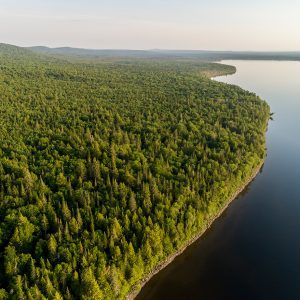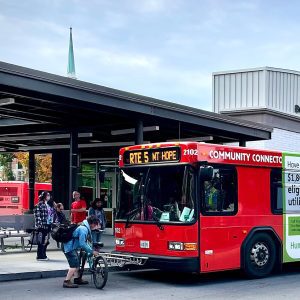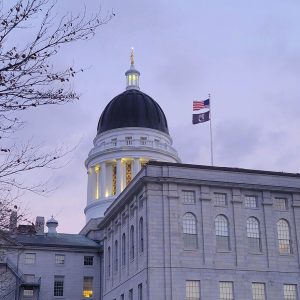The start of the legislative session in Maine is always an exciting time. A time of promise and possibilities. This year, we’re focused on advancing progress for Maine’s environment and communities by acting on climate, expanding access to the outdoors for all, and safeguarding a healthy environment.
Nearly 2,200 bills have been filed, and we’ve already identified 275 that could benefit or harm Maine’s environment in some way. The Natural Resources Council of Maine is your partner in helping to navigate them all so you can make the biggest impact for our environment.
Our team of experts will be in the halls and hearing rooms of the State House for the next five months tracking legislation, submitting testimony, and negotiating outcomes that benefit the environment and people of Maine. And our outreach team will help break it all down for you with actionable steps you can take to make a difference.
Here are NRCM’s 2025 Legislative Priorities for Maine’s Environment:

Protecting Maine’s Iconic North Woods
The rich ecological diversity of Maine’s North Woods—and the entire Unorganized Territories—are globally significant, serving as a valuable carbon sink, providing habitat for a rich array of wildlife, and supporting a robust outdoor recreation economy.
Traditions, memories, and livelihoods are made here thanks to broad public access to an intact forested landscape that’s rare in the entire Eastern United States. But the future of this region is at risk unless we act now to reform the way it is managed to protect the unique natural resources of this area that comprises 10.5 million acres – half of the state.
NRCM and our partners will be pursuing a set of three bills to:
- Study the future of recreational access to the North Woods
- Protect older growth forests and remote ponds that support wildlife
- Strengthen the Land Use Planning Commission to ensure it has the skills and statewide perspective needed for the future
Related, NRCM will also be working with partners to support new funding for the popular and effective Land for Maine’s Future program that supports projects across all 16 counties, including working waterfronts, farms, and expanded access to outdoor spaces.

100% Clean Energy by 2040
Achieving 100% clean electricity by 2040 will create new good-paying jobs, save Mainers money, and help us become more energy independent.
Maine’s over-dependence on fossil fuels for heating, transportation, and power generation is the primary driver of the high energy prices facing Maine families and businesses. NRCM supports legislation to achieve 100% clean electricity by 2040 because it is a practical path forward to a lower-cost energy future, more diverse energy supply, and a strong economy. For example, the 2025 Maine Energy Plan shows that reaching 100% clean electricity by 2040 could lower average household energy costs by about $1,300 per year.
There will be a lot of debate about what renewable energy sources are included in this goal. Along the way, we’ll be insisting that Maine develop homegrown clean energy sources that lift communities up and deliver real, additional renewable energy to the electric grid. We’ll also be pushing for responsible development of clean energy to protect Maine’s heritage fishing and farming industries, while preserving our state’s rural character and conserving natural resources.

Cleaner, Healthier Transportation Options
Transportation emissions are the largest source of climate pollution in Maine. Investing in clean transportation options like more frequent and reliable public transit and streets that protect people walking, biking, and rolling. It is time to plan for a smarter, safer, and cleaner transportation future that protects our health and supports local economic opportunity.
NRCM will be working with youth climate activists and other partners to build a movement that pushes for investments in a more modern transportation system that serves ALL of Maine in three ways:
- Aligning transportation planning with Maine’s climate goals so that Maine is investing in transportation projects that reduce harmful air pollution while giving people healthier, more affordable options.
- Implementing the recommendations of the Public Transit Advocacy Council to invest in more reliable public transportation service statewide.
- Increase transparency for how we spend our limited transportation funds by establishing clear project selection criteria at the Maine Department of Transportation (MaineDOT) for all new projects.

Tribal Sovereignty
NRCM will continue to support the Wabanaki Nations in their efforts to achieve State recognition of tribal self-determination. Achieving Tribal sovereignty also will enable the Wabanaki Nations to gain access to federal programs and grants that currently have been inaccessible.
The Natural Resources Council of Maine is a proud member of the Wabanaki Alliance Tribal Coalition and stands in solidarity as they seek to secure full sovereignty of the Tribes in Maine. We all depend on a clean, healthy environment and are united by our love for Maine outdoors. We must use this unity to ensure equity and fairness for all. NRCM will continue to work with the Wabanaki people and their many allies to build a healthier, more just future.

Stopping Rollbacks of Common-sense Environmental Policies
Every year, we face efforts to repeal or weaken common-sense laws that are safeguards for Maine’s environment. Unfortunately, this year is no exception, with more than 40 rollback bills that we will work to defeat.
We’ll be especially focused on stopping several attempts to repeal the single-use plastic bag ban that is reducing plastic pollution on our lands and ocean waters, and harming wildlife. If anything, the law should be strengthened to block the use of thicker plastic bags, as some national retailers that have stores here in Maine have started using, trying to pass them off as “reusable.” We’ll also be on the lookout for attempts from corporate lobbyists to undermine Maine’s Extended Producer Responsibility for Packaging law, which will provide municipalities with critically needed funds to support and expand recycling of packaging waste.
There are also several bills to repeal the state’s Net Energy Billing program, which has already been reformed by lawmakers three times in the recent past. Solar energy is saving towns and businesses money and helping us avoid more polluting sources like natural gas. Maine can’t afford to stop moving this important energy source forward. Instead of undermining investments in solar, we should redouble our efforts to reduce our dependence on fossil fuels by advancing homegrown clean energy sources.
How You Can Help: Working Together to Protect What We Love
While we plan to expand opportunities for everyone here in Maine, we know that the Trump Administration has a different view. That’s why we’ll also focus on defending Maine’s environment by opposing proposed rollbacks of our nation’s bedrock clean air and water laws and attempts to slash federal programs that are critical for addressing climate change,
We’ll need to meet this moment by listening, learning, and building a strong statewide community of people willing to make a difference. You can help us make the most progress possible this year by getting involved in a variety of ways:
- Keep track of all the bills we’re following on our bill tracking page.
- Receive regular updates of ways you can help by signing up for action alerts.
- Attend our State House Action Day on April 8th, or attend one of our Take Action Tuesdays (new this year!).
As in past years, NRCM is a member of the Environmental Priorities Coalition, which is an inclusive statewide alliance of 39 conservation, climate action, and public health organizations that has identified a slate of nine priorities bills for the legislative session. You can view them here.
Thank you for being part of our work to protect what we love about Maine’s environment, for today and future generations.
Watch a recording of our 2025 Legislative Priorities webinar:
Banner photo: Shoreline of Square Lake, Square Lake Township, Aroostook County, by JMonkman/NRCM










Leave a Reply